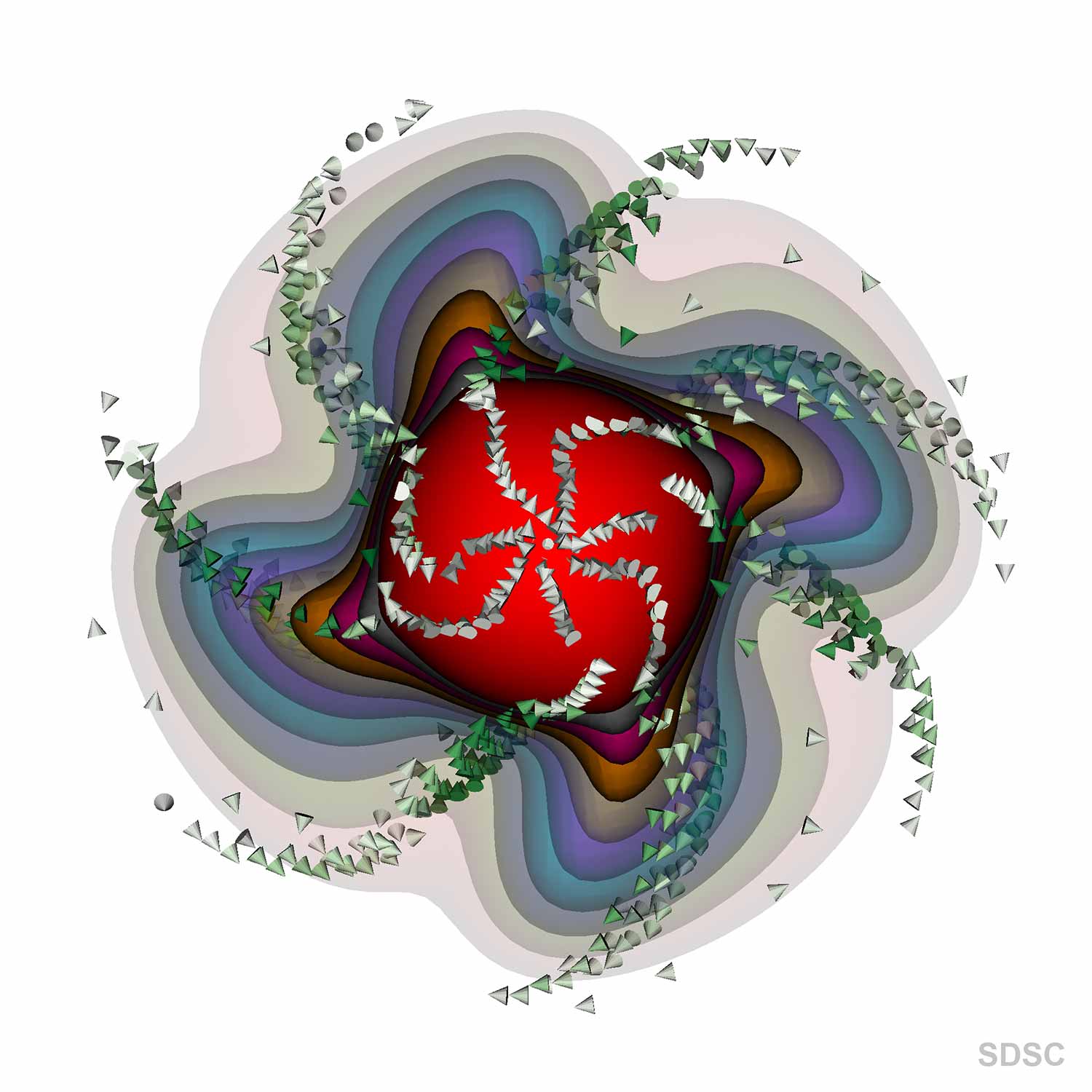SDSC Granted $1.3 Million Award for ‘SeedMe.org’ Data Sharing Infrastructure
Award Part of National Science Foundation’s Data Infrastructure Building Blocks Program
Published Date
By:
- Jan Zverina
Share This:
Article Content

This image and related research data, one of numerous projects being shared and stored using SeedMe, shows a simple model of geodynamo used for benchmark codes. The view is from center toward one of the poles, and the cones show convective flow toward higher temperature (light green to dark green with increasing velocity) in a spiraling form caused by rotation. The shells of various colors depict temperature, increasing from the outer boundary towards the interior. Courtesy of Amit Chourasia*, Ashley Willis^, Maggie Avery*, Chris Davies*#, Catherine Constable*, David Gubbins#. *UC San Diego, ^University of Sheffield, #University of Leeds, UK.
Researchers at the San Diego Supercomputer Center (SDSC) at the University of California, San Diego have received a three-year, $1.3 million award from the National Science Foundation (NSF) to develop a web-based resource that lets scientists seamlessly share and access preliminary results and transient data from research on a variety of platforms, including mobile devices.
Called SeedMe – short for ‘Swiftly Encode, Explore and Disseminate My Experiments’ – the new award is from the NSF’s Data Infrastructure Building Blocks (DIBBs) program, part of the foundation’s Cyberinfrastructure Framework for 21st Century Science and Engineering (CIF21). The DIBBs program encourages development of robust and shared data-centric cyberinfrastructure capabilities to promote interdisciplinary and collaborative research. A summary and list of the 2014 DIBBs awards can be found here.
The newly funded project, called ‘Ubiquitous Access to Transient Data and Preliminary Results via the SeedMe Platform’ and to begin October 1, 2014, builds on the foundation made possible by an $810,000 NSF grant awarded under a separate program in late 2012 to develop a web-based architecture that focused on sharing and accessing visualization related outputs.
“The current SeedMe project highlighted the need for additional capabilities and several feature requests from our current users,” said Amit Chourasia, a senior visualization scientist at SDSC and principal investigator for the project. “We will use the lessons learned from the current SeedMe project and extend it to make it more general and applicable to a broader research areas and researchers, while allowing SeedMe to be developed as a modular web‑based, feature-rich cyberinfrastructure.”
“SeedMe provides an essential yet missing component in current high-performance computing as well as cloud computing infrastructures,” added SDSC Director Michael Norman, co-PI on the project. “We view this as an important building block project because computational simulations have become an indispensable tool across a very diverse array of science and engineering investigations and having most access to latest results is extremely important for diagnosis, validation and swift iteration of preliminary results saving researchers their precious time as well as allowing them to utilize computational resources efficiently by catching errors sooner.”
Current methods for sharing and assessing transient data and preliminary results are cumbersome, labor intensive, and largely unsupported by useful tools and procedures, according to the SDSC researchers.
“Each research team is forced to create their own scripts and ad hoc procedures to push data from system to system, and user to user,” said Chourasia. “These efforts often rely on email and other means, despite the ubiquity of much more flexible dynamic web-based technologies and the impressive display and interaction abilities of today’s mobile devices. SeedMe’s goal is to convert a slow, manual, serial, error prone, repetitive, and redundant sharing and assessment process into a streamlined automatable process that could be easily integrated into existing scientific applications and procedures.”
SeedMe’s building blocks will be broadly applicable to a diverse set of scientific and engineering communities. “In addition, the SeedMe platform will be open sourced so that it can be replicated and extended by a wide range of users, from students to professional researchers,” said Chourasia. “The central SeedMe website will be a common resource for sharing transient data and preliminary results that will enable significant time saving for researchers by providing a simple and ready to use cyberinfrastructure for collaboration. The website will serve as an open web accessible and searchable archive of results and reusable content, making it also suitable for educational and outreach programs for scientific and wider audiences.”
The NSF DIBBs award also calls for SeedMe to organize and conduct tutorials, webinars, and other presentations to promote the resource and train new users. Internships will be provided to high school and undergraduate students so they can learn more about new web technologies and a diverse range of research opportunities.
As part of the current award, SeedMe is now inviting researchers from industry and academia, and across numerous domains, to familiarize themselves with the resources easy-to-use functionality for sharing science results with their peers or the public at large.
“This new award will allows us to not only continue but accelerate those efforts to demonstrate how SeedMe enables convenient sharing and streaming of data-intensive scientific research, especially within research teams,” said Chourasia.
The NSF award number is 1443083 and runs until an estimated date of September 30, 2017. In addition to Chourasia and Norman, the SeedMe project team includes David Nadeau, and other staff at SDSC.
Share This:
You May Also Like
Stay in the Know
Keep up with all the latest from UC San Diego. Subscribe to the newsletter today.



